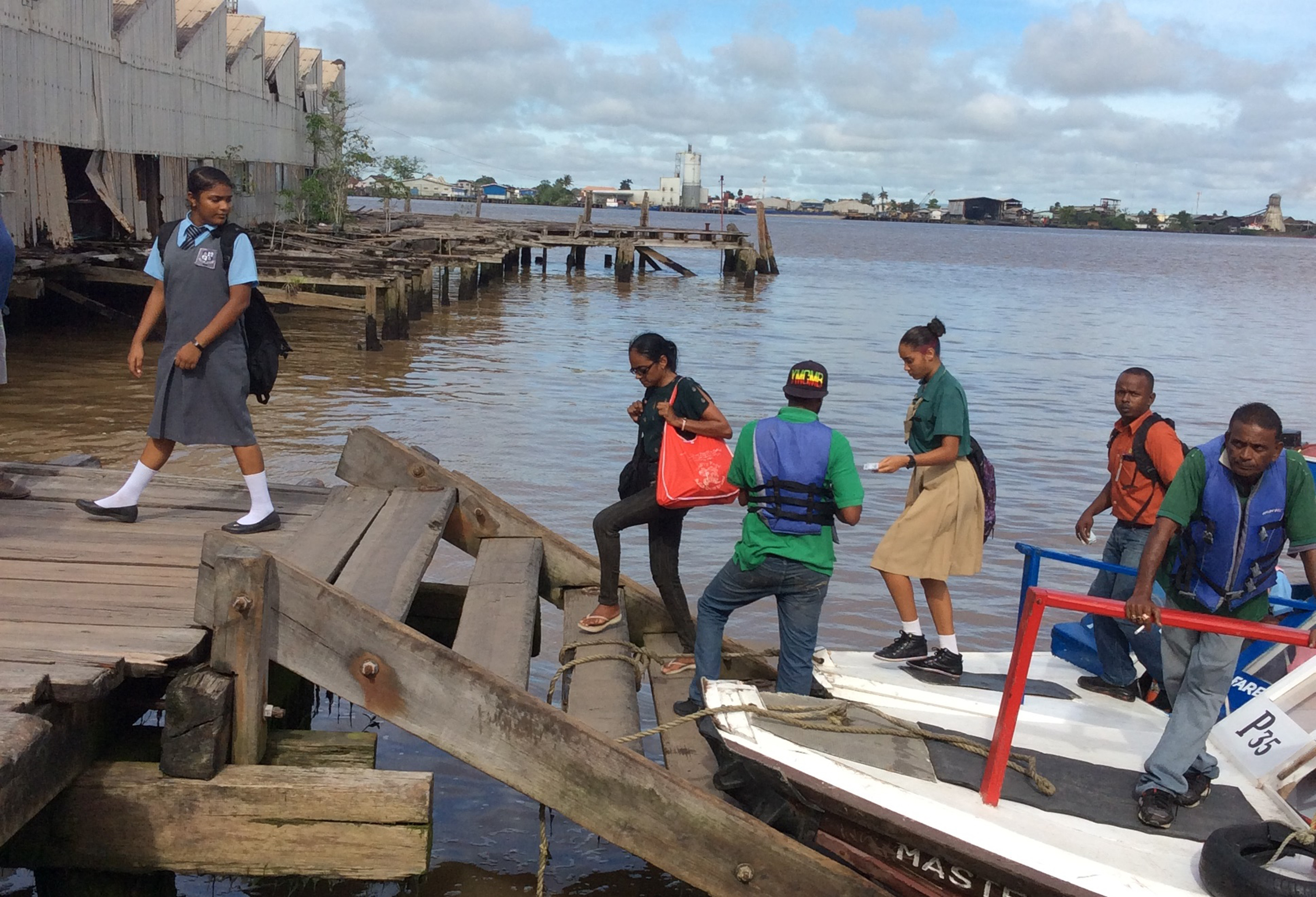Vreed-en-Hoop, West Coast Demerara was bustling as with dark clouds hanging overhead, everyone was hurrying to get about their business done before the rains came.
Many people were heading towards the stelling to board the boats which have sheds and are equipped with lifejackets that each passenger is required to wear.
For a fee of $100, they get across to Georgetown in about five minutes, much faster than if they had used the Demerara Harbour Bridge (DHB). During the morning rush hour there are long lines of vehicles trying to get to and from the stelling road and to the West Bank Demerara road that leads to the DHB. Police officers are usually at the junction trying to keep the traffic under control as the traffic lights seem not to work.
A hire car driver who wished not to be named suggested that a bypass be created at the Crane turn and end at Schoonord to divert the bridge traffic. This, he said, would result in an easier flow and less frustration.
The driver complained about private cars working as taxis and about the police harassing them and sometimes pulling their vehicles in the station. When this happens, he said, the private cars “get to continue picking up passengers freely.”
He said he and other drivers have made many reports at the Vreed-en-Hoop Police Station but the officers have told them that they cannot do anything about it. Their next move is to meet with the commander at Leonora.
Residents of the area said the drains are not being maintained and are clogged. With the heavy rainfall their yards are flooded. They lamented too that they “pay taxes but we still have to pay the garbage truck to remove garbage.”
They are also disgusted with the noise nuisance in some parts of the village, especially where there are rum shops.
“If is not the shops blasting the music, is vehicles coming and park up there with big speakers. And you can’t talk for your right, they curse you,” a resident said.
Businesses
Vreed-en-Hoop is Dutch, though it is usually spelled “Vrede” and translated to English it means Peace and Hope. The community has all the facilities of a town with all of the economic activities that take place there available to make life easier.
Close to stelling, a rather busy area, ‘short-drop’ cars plying the West Bank and New Road, Vreed-en-Hoop route and minibuses are parked on either side.
There is also the War Memorial that was refurbished in 2009 by Len’s Hardware at a cost of $800,000. It definitely needs a facelift though.
Beyond the vehicles are a number of stalls that house snackettes, beer gardens, a photo studio, cell phone and CD shops, computer sales and repairs, barber shops and hairdressing salons.
Tucked away on one side of the road is the recently commissioned Guyana Power & Light 26 MW power plant.
Vreed-en-Hoop is home to the Regional Democratic Council office, a police station, magistrate’s court and post office.
Along the stelling road, there is a Dairy Queen and Church’s Chicken outlets, general stores, boutiques, supermarket, mini malls with various small businesses and a market, as well as Republic Bank and a Lucky Dollar (Furniture and electronics store) branch.
There are also other businesses including Chicken N Burger Delight, M&M Snackette, Red Cherry Parlour, Chinese restaurants, a lumber yard, taxi services, insurance companies and auto sales.
Inside the derelict stelling is a park that accommodates taxis which do mostly special hire services for longer distances.
To avoid the traffic jam at the DHB owners of private vehicles would opt to park at the stelling and use a boat to travel to Georgetown to transact business. They would pay a parking fee of $300 to $500 to the Transport & Harbours Department (T&HD), depending on the time spent. The stelling also offers space to clothing vendors at $300 per day.
Residents would be happy if the stelling can be renovated as promised because of its use to the community; they say it would be a shame if it is allowed to deteriorate further.
Oasis away from Oasis
Nisa Walker was sitting in her hammock with a cup of tea admiring her beautiful flower garden. A chef and proprietor at Oasis Café, it’s one of the places she is the happiest, when not in the kitchen.
Having designed the garden/landscape herself, Nisa sees it as an oasis away from Oasis. It is the main attraction of her home and whenever she invites friends over they choose to remain in the garden, enjoying her gazebo. Having a beautiful garden does not come easily, but she has achieved it by spending a lot of time with her plants, cajoling them, she says.
Further up the road, Tarmattie Persaud, 68, fondly known as ‘Aunty Dai’ took a break from her sewing when this newspaper dropped in.
She has been a seamstress since the age of 14, discovering her hidden talents after she started cutting and sewing baby clothes for her niece. Eager to develop her skills further, she started sewing for the neighbours’ children as well. Her interest in sewing began while engaging in needlework at school.
Originally from Bush Lot, West Coast Berbice, Persaud moved to Vreed-en-Hoop when she got married 45 years ago and soon became well established in the sewing business.
She designs her own fashions and also does knitting and makes decorations for weddings.
Although many of her clients would bring their own styles she would advise them on what is best suited for the fabric they would have purchased.
Her husband who worked as a labourer, died in 1993 and Persaud’s independence allowed her to raise her three children single-handedly.
When she’s not busy sewing, she utilizes her skills in cooking and baking. She also does catering with the help of her daughters Pamela and Kamla who live nearby and her daughter-in-law, Mala.
She recalled that, “Vreed-en-Hoop was different when I came here first. We had red road and just a few persons had potable water in dem yard.”
Her mother-in-law was one of them and villagers used to go there and line up and wait to fill their jars and buckets.
Many times there would be quarrels because “some people take too long and who left at the back don’t get; the water does cut off by then…
“Life much better now by far… We have good road and we have a hospital, electricity and telephone. We hope life would get even better now with this new government,” she said.
Across the road, Haseeb Hamid operates a welding and fabrication shop. He took this newspaper to meet his wife, Deborah and went back to work. She had completed her household chores and was resting in a hammock under the house.
She also assists Haseeb to manage his business and keeps busy in the evening helping their three children with homework.
Deborah, who is originally from Stanleytown, West Bank Demerara worked briefly at Ready Mix Concrete as an accounts clerk. She likes Vreed-en-Hoop because “it is a business area.”
She spends quality time with her family especially on weekends when she and Haseeb would take the children out for fun activities.
She said this also helps her children to use their imagination and when writing essays at school about what they did for the weekend.
Harry Deodharry, who operates a civil engineering consultancy service has been practicing in Vreed-en-Hoop for the past three years but has been established since 1988 at Prashad Nagar.
Originally from Canal Number 2 Polder, he moved to the village since in the 1980s.
He worked at a private engineering company for 13 years before pursuing a course at the University of Guyana, following which he started the business with a partner.
Plastic City
Away from the order and the successful businesses, is the depressed section of Vreed-en-Hoop known as ‘Plastic City.’
The houses are small and rundown and paint a picture of struggle. In one section there is electricity and water while on the other side, residents have never had that luxury.
They have to go quite a distance with their buckets to fill water for drinking and household use.
Located close to the seaside and with the land being very low, residents suffer severe flooding when the tide is high and when it rains heavily. It is almost impossible for them to leave their homes during that time.
They also said a section of the seawall is eroding and that a dam needs to be built urgently to ease the situation.
When we visited, a group of young people standing at the corner of the street said they were too shy to have their photos taken and to “be in the papers.”
One, who gave his name as Shawn, said they do construction but “the work would come now and then, like sometimes we get a two-day or three-day…” Other than that he would do a “lil hustle,” catching and selling fish.
He moved to the area from Belle West scheme three months ago to live with relatives because “me ain had nowhere else to go.”
A resident, Raffudeen Bacchus, a retired seaman was leaving to go out at the time. He started living in the area 18 years ago.
He’s 70 years old but looked younger and said it is because “ah eat good food, no animal food… And I do a lot of breathing exercises early in the morning.”
He helps out on his friend’s at Sheribana in the Demerara River where he is originally from.
Eighteen-year-old, Kenneth Simon was sitting on top of his stairs doing laundry and listening to reggae music.
His mother with whom he resides was away at work. He also does construction work but none was available at the time.
Next door his aunt, Ena Peters, 60, was cleaning her home. She too finds it hard to fetch water and was happy that she was getting rain water to use.
She has been living there for the past 20 years and said life has not improved. She is a former security guard and her children help her out financially.
Her neighbour, Wendy Williams, has also been living in Plastic City for 20 years. She babysits her daughter’s one-year-old baby Kendra and “would get a lil small piece.”
Williams was happy that the youth are “nice and co-operative” and do not get into trouble despite the conditions under which they live.
“They are not lazy; they want something to do,” she said. They would sometimes fetch water and fill “black tanks” for residents for a fee or “would go and strip brooms and sell.”
Williams was happy that poverty was not preventing the children from “going to school and taking in their education.” A few youth have moved out of the area in search of a better life.
She hopes that one day life in the area would improve and said “we ain’t giving up because there is a God. With God all things are possible and He would make things change for us.”










